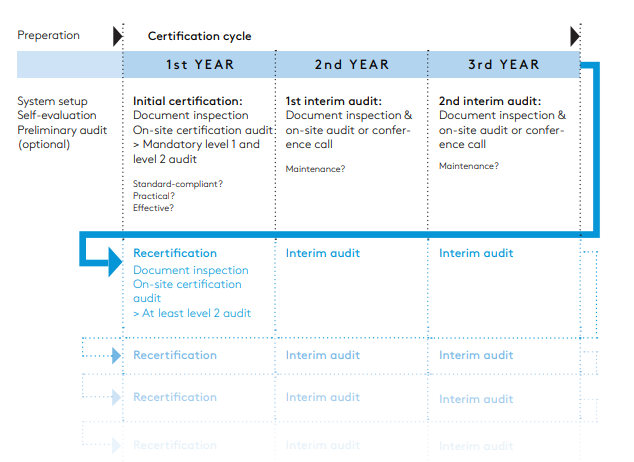eduQua – quality label for contuining education
eduQua is the Swiss quality label for contuining education providers. The label promotes transparency, comparability, and quality in contuining education courses. Over 1,000 schools, Departements, and academies throughout all of Switzerland are eduQua-certified. Certification not only improves credibility with customers, but is also an advantage when dealing with the authorities. In many cantons, the eduQua certificate is a prerequisite for receiving public funding.
Target groups
The eduQua label is designed for institutions, who are active in the areas of adult and contuining education.
Validity
3 years
An annual re-certification audit is carried out to ensure continuous further development.
Recognition
The eduQua certificate is recognized in Switzerland.
Processes and costs
The certification process and costs vary depending on the size of the contuining education institution. The process is determined on the basis of the participant lessons conducted each year.
Contact us for an initial consultation and offer.
Sponsorship and organization of the eduQua label
The Swiss Federation for Adult Learning (SVEB) has been the sole sponsor of the eduQua quality label since 2018. It manages the eduQua office and ensures the operation of the system. SVEB management board acts as the steering committee.
The eduQua monitoring group plays a key role as an advisory body in the further development of the label. The members of the monitoring group are representatives from the public sector, funding structures, as well as private and public contuining education providers.
The certification bodies are responsible for carrying out the certification procedure at the contuining education institutions. They are accredited by the Swiss Accreditation Service (SAS).
The path to eduQau certification
eduQua certification is available to all adult and contuining education providers, who wish to develop and demonstrate their quality standards. In addition to state-funded contuining education institutions (public and private providers), providers of vocationally oriented contuining education, and all other areas of adult and contuining education can also be certified.
Principle:
eduQua is a certificate for contuining education institutions, not individual courses or people. The contuining education institutions or an contuining education department in a company are regarded as the body receiving the certification.
This means that the eduQua label may not be associated with the courses in advertising, but only with the institution.
Institutions that already implement another quality management system and have corresponding certifications do not automatically receive an eduQua certificate.
Certification processes
In the certification process, providers demonstrate that they meet the specified quality requirements and have established an effective quality system.
The criteria and requirements of eduQua give clear guidelines and suggestions on how to build a quality management system for your organization. As part of a self-evaluation, they examine the status of the management system and the quality of the contuining education courses. This allows opportunities for internal development to be identified.
An institution must meet the key requirements to obtain eduQua certification. These are presented in detail in the document «Quality Standard eduQua:2021».
The institution compiles the dossier in accordance with the 8 principles and 19 criteria, including self-evaluation, and submits it to our accredited certification body.
The certification body or the auditor assigned to the certification evaluates the dossier and assesses the implementation and effectiveness of the quality management system in an on-site audit. As part of the certification process, the institution receives feedback on the state of their quality management system and notes on further development.
If the institution meets the criteria, the certification body issues them with the eduQua certificate.
Certifications must be renewed every three years. The most important changes to the organization and its courses and services are reviewed in a yearly interim audit.
The management of the certification body guarantees an independent and impartial assessment by qualified and procedurally trained auditors.
The following illustration shows the 3-year certification cycle and re-certification across the various phases.


